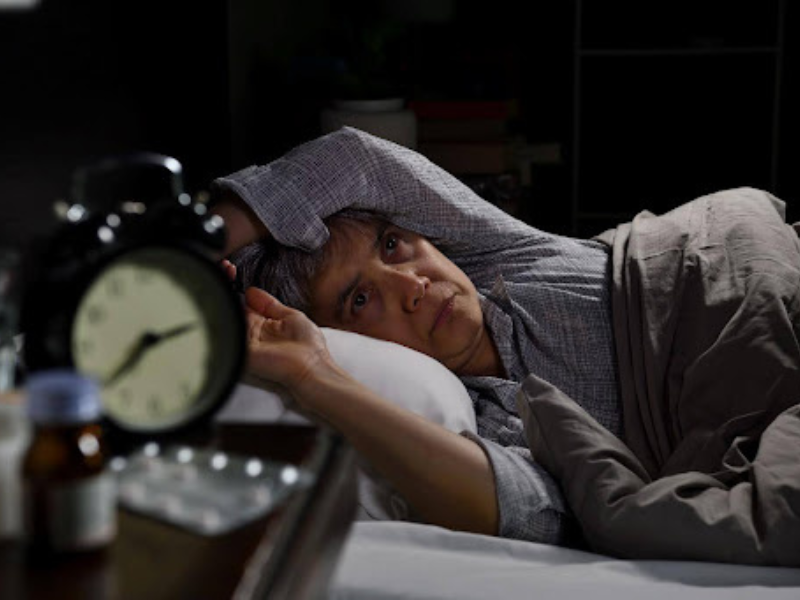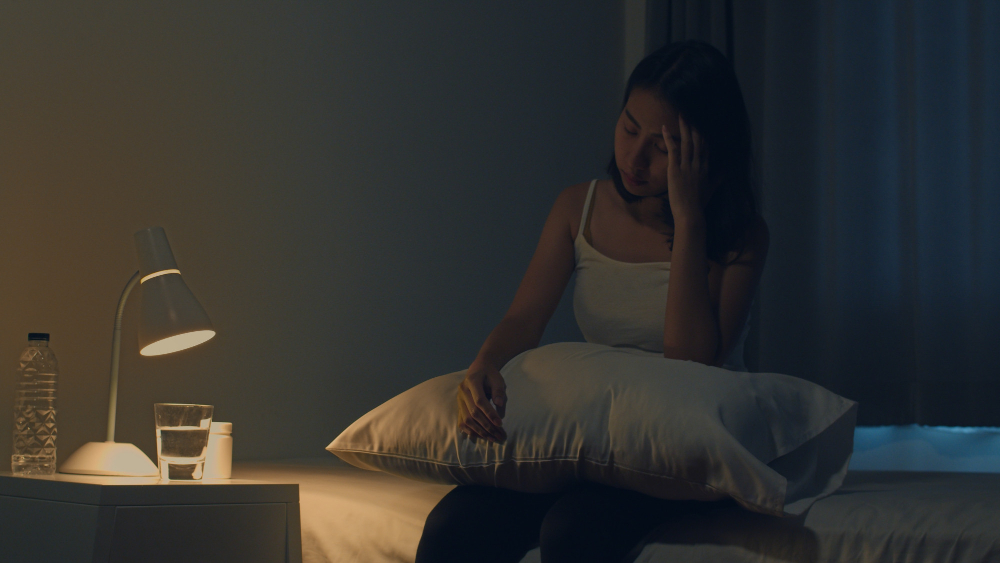
Exploring the Relationship Between Menopause and Sleeplessness
Sleepless nights. Tossing and turning. Waking up drenched in sweat. For many women, these scenarios are all too familiar as they navigate the turbulent waters of menopause. While we often hear about hot flashes and mood swings, sleep disturbances are one of the most frustrating symptoms of menopause. If you’re finding it harder to get a good night’s rest, you’re not alone.
In this article, we’ll explore what causes sleeplessness in menopause, the impact it can have on daily life, and most importantly, some menopause sleeplessness remedies that can help you regain restful nights.
The Connection Between Menopause and Sleeplessness
So, what causes sleeplessness in menopause? The answer lies primarily in our hormones. During menopause, levels of estrogen and progesterone—the hormones that regulate sleep—fluctuate and eventually decline. Estrogen helps the body use serotonin and other neurotransmitters that help regulate sleep. Progesterone, on the other hand, has a sedative effect, promoting relaxation and calm. When the levels of these hormones drop, sleep patterns often become disrupted.
But it’s not just about hormones. Menopause and sleepless nights often go hand-in-hand with other physical and emotional changes. Many women experience hot flashes and night sweats that wake them up multiple times during the night, making it difficult to fall back asleep. Increased anxiety and mood swings, another common aspect of menopause, can further contribute to restless nights.
Common Sleep Disruptors During Menopause
1. Hot Flashes and Night Sweats
Picture this—you’re finally drifting off when suddenly you wake up feeling like you’re in a sauna. Hot flashes are sudden bursts of heat that can occur at any time but are especially bothersome at night. When they strike during sleep, they lead to night sweats that can soak your sheets and leave you wide awake. These episodes are one of the biggest culprits behind menopause and sleepless nights.

2. Mood Changes
Menopause can feel like an emotional rollercoaster. With fluctuating hormone levels, it’s normal to experience mood swings, anxiety, and even feelings of depression. These mental shifts can keep your mind racing long after you’ve turned off the lights, making it nearly impossible to settle into a peaceful sleep.
3. Physical Discomfort
Aching joints, headaches, or general discomfort may become more frequent during menopause, further disrupting your ability to sleep soundly. Sleep becomes lighter, and even small disturbances can wake you up, leading to fragmented sleep.
4. Frequent Urination
Declining estrogen levels can weaken the pelvic muscles and bladder control. Many women find themselves needing to get up to use the bathroom multiple times a night, adding to the cycle of sleep disruption.
The Effects of Sleeplessness on Health
You might wonder, “So I’m not sleeping well—what’s the big deal?” Unfortunately, menopause and sleeplessness can take a toll on your overall health. When sleep is consistently interrupted, you may start to feel its effects on your physical, mental, and emotional well-being.
- Short-Term Effects: On a day-to-day basis, lack of sleep can lead to irritability, difficulty concentrating, and general fatigue. Ever notice how everything seems harder to deal with after a night of poor sleep? That’s your body’s way of telling you it needs rest.
- Long-Term Effects: Chronic sleep deprivation can have more severe consequences, increasing the risk of conditions such as heart disease, diabetes, and depression. Your immune system weakens, making you more susceptible to illness, and the constant exhaustion can affect your mood and relationships.
- Impact on Daily Life: We often underestimate how critical sleep is for everyday functioning. Poor sleep can affect productivity at work, your patience with family, and even your motivation to stay active and eat healthily.
Menopause Sleeplessness Remedy
The good news? There are ways to tackle menopause and sleepless nights. While you might not be able to avoid all sleep disturbances, there are strategies to make them less disruptive.
1. Lifestyle Changes for Better Sleep
- Regular Exercise: Exercise is a natural way to boost serotonin levels and improve mood. It can also reduce anxiety and help regulate sleep patterns. Aim for at least 30 minutes of moderate exercise most days of the week, but try to avoid vigorous exercise close to bedtime as it may have the opposite effect.
- Dietary Adjustments: Consider cutting back on caffeine and alcohol, especially in the evening, as both can interfere with sleep. Focus on a balanced diet rich in fruits, vegetables, and whole grains, and avoid heavy meals late at night. Foods high in magnesium, like leafy greens and nuts, can promote relaxation and better sleep.
- Stay Hydrated: Drinking enough water throughout the day is essential, but limit your fluid intake a few hours before bedtime to reduce nighttime trips to the bathroom.

2. Practicing Good Sleep Hygiene
- Establish a Bedtime Routine: Just like children, adults benefit from a consistent bedtime routine. Create a relaxing ritual that signals to your body that it’s time to wind down. This could include taking a warm bath, reading a book, or practicing deep breathing exercises.
- Create a Comfortable Sleep Environment: Keep your bedroom cool, dark, and quiet. Use breathable sheets and wear lightweight clothing to help manage night sweats. Consider investing in a fan or an air conditioner to keep the temperature comfortable.
- Limit Screen Time: The blue light from phones, tablets, and computers can interfere with your body’s production of melatonin, a hormone that regulates sleep. Try to avoid screens at least an hour before bedtime.
3. Stress Management Techniques
- Meditation and Yoga: These practices can help calm the mind and reduce anxiety, making it easier to fall and stay asleep. Incorporating mindfulness into your routine can improve both your mental state and your sleep quality.
- Breathing Exercises: Simple breathing exercises, like deep belly breathing or the 4-7-8 technique (inhale for 4 seconds, hold for 7, and exhale for 8), can help you relax and drift off to sleep.

4. Medical and Natural Remedies
- Hormone Replacement Therapy (HRT): For some women, HRT can alleviate symptoms of menopause, including sleep disturbances. However, it’s essential to consult with a healthcare professional to understand the risks and benefits based on your health history.
- Non-Hormonal Medications and Supplements: Melatonin, a natural hormone that regulates sleep, can be taken as a supplement to support a better sleep cycle. Other medications, such as certain antidepressants or sleep aids, may also be helpful but should be used under medical guidance.
- Herbal Remedies: Natural remedies like chamomile tea, valerian root, and lavender essential oils have been known for their calming properties. They may help you relax and ease into sleep.
5. Cognitive-Behavioral Therapy (CBT) for Insomnia
CBT for insomnia is a structured program that helps address the thoughts and behaviors contributing to sleep problems. It can be especially effective for those dealing with anxiety or mood changes during menopause. Through relaxation techniques, sleep scheduling, and cognitive restructuring, CBT can provide lasting improvements in sleep quality.
When to Seek Professional Help
If your sleep problems persist or worsen, it’s time to consult a healthcare provider. Signs that indicate a need for professional intervention include:
- Difficulty falling asleep or staying asleep for more than a month.
- Waking up feeling exhausted despite getting a full night’s rest.
- Experiencing severe anxiety, depression, or other health issues related to poor sleep.
Sleep specialists, gynecologists, and menopause experts can work with you to find a tailored menopause sleeplessness remedy that fits your unique needs. There is no one-size-fits-all solution, but with the right support, restful nights are within reach.
Key Takeaway
Menopause and sleepless nights can feel like a challenging and frustrating part of life, but it’s important to remember that you’re not alone. By understanding what causes sleeplessness in menopause and exploring the various remedies, you can take control of your sleep and improve your overall well-being.
Sleep is not just a luxury—it’s a necessity. By adopting healthier habits, seeking support, and being kind to yourself, you can find ways to navigate menopause and sleeplessness with greater ease and comfort.
Citations
- The North American Menopause Society. “Menopause and Sleep.” The North American Menopause Society (NAMS), www.menopause.org/for-women/menopauseflashes/sleep. Accessed 17 Sept. 2024.
- National Institutes of Health. “Menopause: Sleep Problems.” National Institutes of Health (NIH), www.nih.gov/health-information/menopause/sleep-problems. Accessed 17 Sept. 2024.
- Mayo Clinic. “Menopause Symptoms: Sleep Problems.” Mayo Clinic, www.mayoclinic.org/diseases-conditions/menopause/symptoms-causes/syc-20353397. Accessed 17 Sept. 2024.
- Harvard Medical School. “Menopause and Insomnia.” Harvard Health Publishing, www.health.harvard.edu/womens-health/menopause-and-insomnia. Accessed 17 Sept. 2024.




